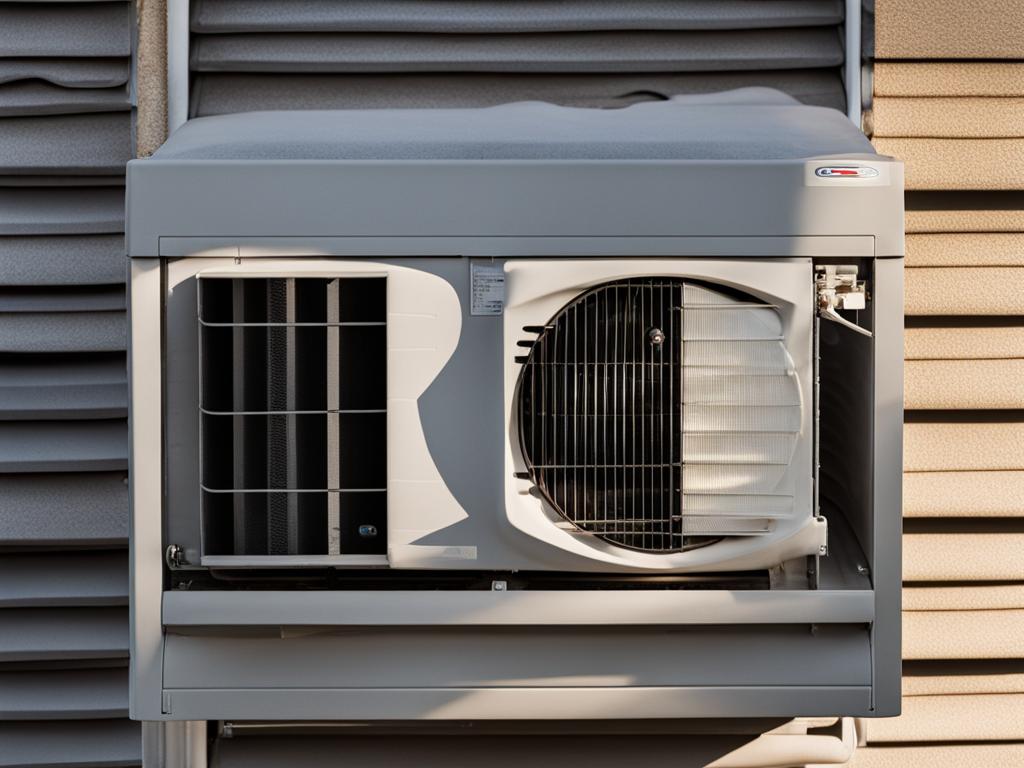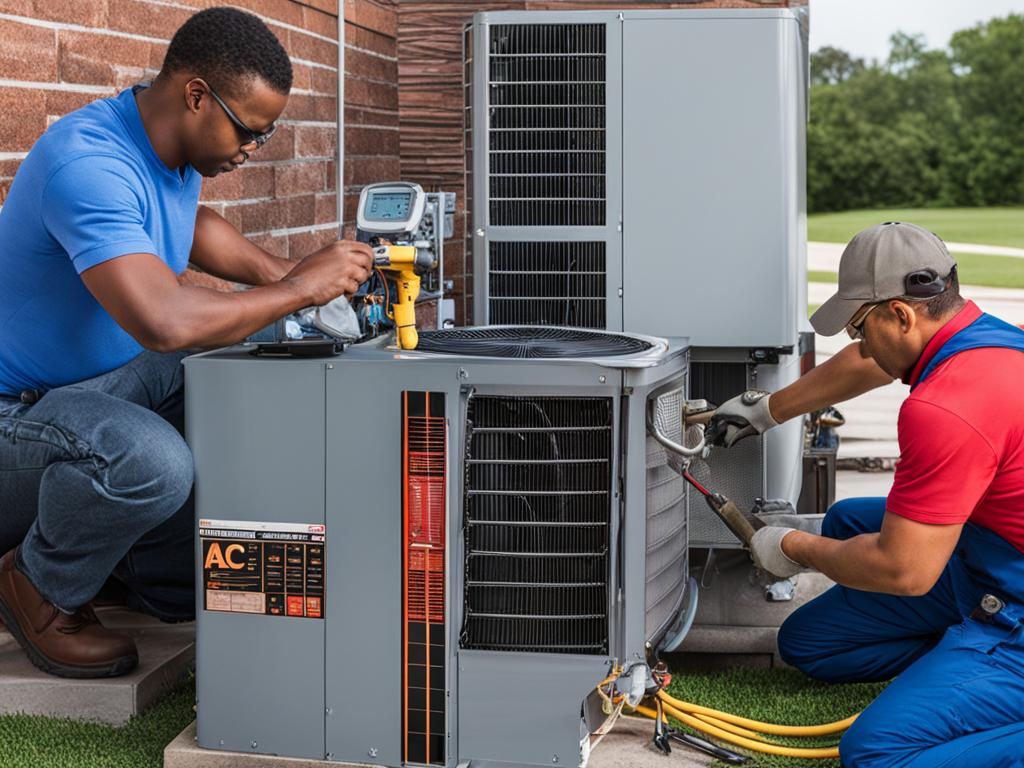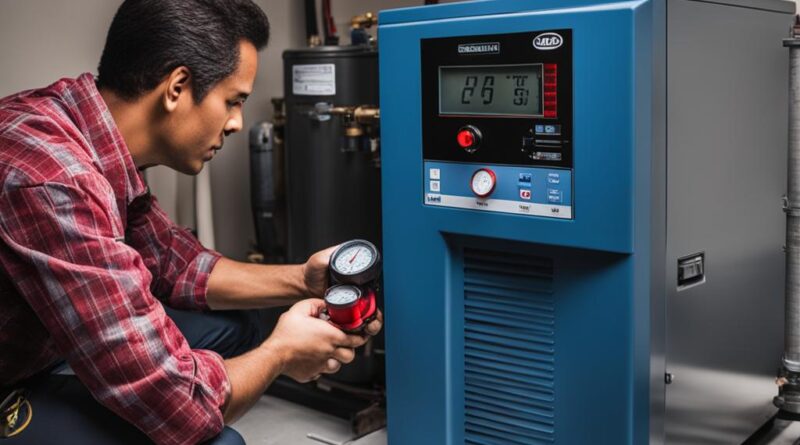Simple Steps: How to Fix Overcharged AC Efficiently
An overcharged air conditioner can cause issues with the cooling performance and efficiency of your AC system. In this section, we will discuss the symptoms of an overcharged AC, the causes of overcharging, and the consequences it can have on your system. By understanding these factors, you can take the necessary steps to fix your overcharged AC efficiently.
Key Takeaways:
- Recognize the signs of an overcharged AC, such as uneven pressure, frost buildup, and lack of airflow.
- An overcharged AC occurs when there is too much refrigerant in the system, leading to reduced efficiency and potential damage.
- Excessive refrigerant can disrupt the refrigerant cycle and cause compressor failure.
- Fixing an overcharged AC requires depressurizing the system, which should be done by a licensed professional.
- Do not attempt DIY repairs for an overcharged AC, as it can result in further damage and higher repair costs.
What Does Air Conditioner Refrigerant Do?
AC refrigerant plays a crucial role in the cooling process of an air conditioning system. It is responsible for absorbing heat from the air inside your home and then cooling it down before circulating it back into your living spaces. Without refrigerant, your AC system would not be able to provide the cool and comfortable environment you desire.
The refrigerant in your AC system goes through a continuous cycle, transitioning between liquid and gas states as it absorbs and releases heat. This cycle is what facilitates the cooling process. When the refrigerant absorbs heat from the indoor air, it evaporates from a liquid to a gas, absorbing the heat energy in the process. The warm gas then travels to the outdoor unit of your AC system, where it releases the heat and condenses back into a liquid state. This condensed liquid refrigerant is then pumped back indoors to absorb more heat and continue the cooling cycle.
In addition to its role in the cooling process, AC refrigerant also helps in lubricating the compressor of your AC system, ensuring its smooth operation. Without sufficient refrigerant, the compressor can overheat, leading to potential damage and reduced system efficiency.
Understanding the importance of AC refrigerant in the cooling process and the overall functioning of your AC system is crucial when it comes to identifying and addressing issues such as an overcharged air conditioner. By maintaining proper refrigerant levels and ensuring the correct functioning of the refrigerant cycle, you can optimize the performance and efficiency of your AC system.
What Does It Mean When an AC Is Overcharged?
An overcharged AC occurs when there is an excessive amount of refrigerant in the system. Unlike undercharged AC systems, overcharging is less common but can still cause significant problems. Too much refrigerant can lead to reduced efficiency, increased energy costs, and potential damage to the compressor.
When an AC is overcharged, the excess refrigerant disrupts the normal refrigerant cycle. This disruption can result in reduced cooling performance and higher energy consumption. The system has to work harder to circulate the excess refrigerant, leading to increased strain on the compressor.
Recognizing the signs of an overcharged AC is crucial in addressing the issue promptly. Symptoms can include uneven pressure levels, frost buildup, lack of airflow, unusual noises, weak cooling, increased energy bills, and even complete shutdown of the system.
| Signs of an Overcharged AC | Consequences of Overcharging |
|---|---|
| Uneven pressure levels | Reduced cooling performance |
| Frost buildup | Higher energy consumption |
| Lack of airflow | Increased strain on the compressor |
| Unusual noises | |
| Weak cooling | |
| Increased energy bills | |
| Complete shutdown of the system |
It is important to address an overcharged AC promptly to avoid costly repairs or even the need for AC replacement. Depressurizing the system and making necessary corrections should be done by a licensed professional. Attempting to fix the issue on your own can lead to further damage and potentially higher repair costs.
How Do AC Refrigerants Become Overcharged?
One of the most common reasons for an overcharged air conditioner is the improper handling of refrigerant. Inexperienced individuals may add too much refrigerant to the system during installation or when attempting DIY repairs. This can lead to an excess of refrigerant and cause issues with the AC system’s functioning. Another cause of overcharging is incorrectly diagnosing AC problems and assuming that topping up refrigerant will solve the issue.
It is essential to rely on trained professionals for the proper handling and filling of refrigerant in your AC system. Experienced technicians have the knowledge and expertise to ensure the correct amount of refrigerant is added to the system, avoiding the risk of overcharging. They can accurately diagnose AC problems and determine the appropriate solutions, preventing further damage to the system caused by excess refrigerant.
“Overcharging an AC system can lead to reduced efficiency, increased energy costs, and potential damage to the compressor. It is crucial to recognize the signs of an overcharged AC and address the issue promptly to avoid expensive repairs.”
By entrusting your AC repairs to professionals, you can have peace of mind knowing that your system is in good hands. They will be able to accurately diagnose any issues, including overcharging, and take the necessary steps to fix the problem efficiently and effectively. Attempting to fix an overcharged AC on your own can lead to further damage and potentially higher repair costs. It is always best to leave AC repairs to the experts.
What Happens When Your AC Has Too Much Refrigerant?
When an air conditioner is overcharged with refrigerant, it can lead to various issues with the refrigerant cycle and the overall performance of the AC system. Excessive refrigerant can disrupt the normal flow of the refrigerant, causing reduced efficiency, increased energy consumption, and potential damage to the compressor. It is crucial to address an overcharged AC promptly to avoid costly repairs and ensure the longevity of your cooling system.
One of the main consequences of an overcharged air conditioner is the disruption of the refrigerant cycle. The excess refrigerant can cause pressure imbalances within the system, hindering the proper transfer of heat and compromising the cooling process. This can result in reduced cooling efficiency, as the AC struggles to reach and maintain the desired temperature.
Moreover, an overcharged AC can put unnecessary strain on the compressor, the heart of the cooling system. The excess refrigerant can cause the compressor to work harder and longer than necessary, leading to increased energy consumption and potential compressor failure. Compressor failure is a serious issue that can result in a significant repair or replacement cost.
| Common Consequences of Overcharged AC | Symptoms |
|---|---|
| Reduced cooling efficiency | Uneven temperature distribution, weak cooling |
| Increased energy consumption | Higher electricity bills |
| Potential compressor failure | Unusual noises, complete system shutdown |
Recognizing the signs of an overcharged AC is essential for prompt resolution of the issue. Some common symptoms include uneven temperature distribution, weak cooling, higher electricity bills, unusual noises, and even a complete system shutdown. If you notice any of these signs, it is recommended to contact a professional AC technician to assess and fix the overcharged air conditioner.
Signs That Your Air Conditioning Is Overcharged
Air conditioners play a crucial role in keeping our homes cool and comfortable, but when they become overcharged with refrigerant, they can experience various issues. It’s important to recognize the signs of an overcharged air conditioner to address the problem promptly. Here are some common symptoms that indicate your AC may be overcharged:
- Uneven pressure levels: If you notice that some areas of your home are cooler than others, it could be a sign of an overcharged AC. This imbalance in pressure distribution can result in inconsistent cooling.
- Frost buildup: Excessive refrigerant can cause frost to form on the evaporator coil, hindering the cooling process. If you observe frost accumulation on the indoor unit or refrigerant lines, it’s likely that your AC is overcharged.
- Lack of airflow: Overcharging can restrict the airflow in your AC system, leading to reduced cooling performance. If you feel that the air coming from the vents is weak or barely noticeable, it could be a result of an overcharged AC.
- Unusual noises: An overcharged AC may produce strange noises, such as gurgling or hissing sounds. These noises can indicate that the refrigerant is not flowing properly within the system.
- Weak cooling: When an AC is overcharged, it may struggle to cool your home effectively. If you notice that the temperature inside your home is not reaching the desired levels, it could be a sign of an overcharged air conditioner.
- Increased energy bills: Overcharging can lead to reduced efficiency, causing your AC to consume more energy than necessary. If you see a significant increase in your energy bills without a change in usage, it’s worth investigating whether your AC is overcharged.
- Complete system shutdown: In severe cases, an overcharged AC can lead to a complete system shutdown. If your AC suddenly stops working, it could be due to the excess refrigerant causing damage to the compressor or other components.
If you notice any of these signs in your air conditioning system, it’s important to take action. Ignoring an overcharged AC can lead to further damage and potentially costly repairs. Contact a professional AC technician to accurately diagnose the issue and perform the necessary steps to fix your overcharged AC efficiently.

How to Fix Overcharged AC
To fix an overcharged AC, it is crucial to depressurize the system. This process should only be carried out by a licensed professional who has the knowledge and expertise to handle the task safely and effectively. Attempting to fix the issue on your own can lead to further damage and potentially incur higher repair costs.
By contacting a professional AC technician, they can assess the overcharged AC system and determine the best course of action. They will carefully reduce the pressure within the AC system by removing the excess refrigerant. This process involves utilizing specialized equipment and following proper procedures to ensure a successful fix.
Once the AC system has been depressurized and brought back to the appropriate refrigerant levels, the technician will make any necessary corrections to restore optimal functioning. This may involve checking for any leaks, ensuring proper airflow, and verifying that all components are functioning correctly.
Additionally, the technician may recommend regular AC maintenance to prevent future overcharging issues. This can include routine checks of refrigerant levels, inspection of the AC system for any leaks or damage, and cleaning or replacing air filters as needed. By staying proactive with AC maintenance, you can avoid potential problems and prolong the lifespan of your AC system.
Table: Steps to Fix Overcharged AC
| Steps | Description |
|---|---|
| Step 1 | Contact a professional AC technician |
| Step 2 | Assessment of the overcharged AC system |
| Step 3 | Depressurize the AC system by removing excess refrigerant |
| Step 4 | Make necessary corrections to restore optimal functioning |
| Step 5 | Recommend regular AC maintenance |
Should You Try to Fix Overcharged AC on Your Own?
While it may be tempting to attempt DIY repairs on your overcharged AC, it is not recommended. Fixing an overcharged AC requires specific knowledge and expertise that professional AC technicians possess. By trying to fix the issue on your own, you risk causing further damage and potentially incurring higher AC repair costs.
Professional AC technicians have the necessary training and experience to properly diagnose and address overcharged AC problems. They understand the intricacies of AC systems and can safely depressurize the system, reducing the excess refrigerant levels. Additionally, they have access to specialized tools and equipment that are essential for a successful AC repair.
Attempting DIY repairs on your overcharged AC can lead to costly mistakes. Without the proper understanding of the underlying issues, you might end up exacerbating the problem or even damaging other components of your AC system. It is always best to rely on the expertise of a professional AC technician to ensure the correct diagnosis and safe repair of your overcharged AC.

The Risks of DIY AC Repairs
Here are some of the risks associated with attempting to fix an overcharged AC on your own:
- You may not accurately diagnose the problem, leading to ineffective repairs
- You could cause further damage to your AC system, resulting in more costly repairs
- Improper handling of refrigerant can be hazardous to your health and the environment
- Without the proper tools and equipment, you may not be able to perform the necessary repairs accurately
To ensure the safety and proper functioning of your AC system, it is strongly recommended that you leave overcharged AC repairs to the professionals. Contact a licensed AC technician to address the issue promptly and prevent any further complications.
How Often Do ACs Need to Be Recharged?
Proper AC maintenance is essential for optimal performance and longevity of your air conditioning system. One important aspect of maintenance is monitoring the refrigerant levels in your AC unit. Refrigerant is responsible for absorbing heat from the air, cooling it, and then circulating it back into your home. Over time, refrigerant levels can decrease due to small leaks or normal wear and tear. When refrigerant levels are low, your AC may not cool effectively, and it may be necessary to recharge the system.
The frequency at which ACs need to be recharged depends on various factors. One of the main factors is the presence of refrigerant leaks. If there are no leaks in your AC system, it should retain the correct amount of refrigerant without the need for frequent recharges. However, if there are leaks, refrigerant levels will continue to decrease, requiring more frequent recharging. It is important to address and repair any leaks to prevent ongoing issues.
Usage patterns and environmental conditions also play a role in how often ACs need to be recharged. If you use your AC frequently or live in a hot climate, the system may require more frequent recharges. Extreme temperatures can put additional strain on the cooling process, resulting in faster depletion of refrigerant levels. Regular AC maintenance, including checking for leaks and monitoring refrigerant levels, can help identify any issues early on and prevent the need for frequent recharging.
| Factors | Frequency of AC Recharge |
|---|---|
| No refrigerant leaks | Every few years |
| Refrigerant leaks | Varies; more frequent recharges may be required |
| Usage patterns and environmental conditions | Varies; frequent usage or extreme temperatures may require more frequent recharges |
Regular AC maintenance, including professional inspections and tune-ups, can help identify and address any issues that may contribute to the need for AC recharging. By ensuring your AC system is operating efficiently and addressing any leaks or other problems promptly, you can reduce the frequency of recharges and extend the lifespan of your air conditioning unit.

Conclusion
An overcharged AC can lead to reduced cooling performance, higher energy costs, and potential damage to the system. Recognizing the signs of an overcharged AC and taking prompt action to fix the issue is crucial for maintaining the efficiency and longevity of your AC system. By relying on professional AC technicians and regular AC maintenance, you can prevent AC issues and ensure optimal cooling in your home.
Fixing an overcharged AC requires depressurizing the system, which should be done by a licensed professional. Attempting to fix the issue on your own can lead to further damage and costly repairs. By contacting a professional AC technician, they can safely reduce the pressure in your AC system and make any necessary corrections to restore its optimal functioning.
DIY repairs are not recommended for fixing an overcharged AC. Without the proper knowledge and tools, attempting to fix the issue on your own can result in further damage and potentially higher repair costs. It is best to rely on the expertise of a professional AC technician to ensure the correct diagnosis and safe repair of your overcharged AC.
If you are experiencing AC issues, including an overcharged AC, it is important to contact a professional AC repair service. Their licensed technicians have the expertise and knowledge to diagnose and fix AC problems efficiently. By relying on professional services, you can ensure the safety and proper functioning of your AC system.
Contact Us for Professional AC Repair Services
If you are experiencing issues with your air conditioner, including an overcharged AC, it is crucial to seek the assistance of a professional AC repair service. Our licensed AC technicians have the expertise and knowledge to diagnose and fix AC problems efficiently, ensuring the safety and proper functioning of your AC system.
Attempting to fix an overcharged AC on your own can lead to further damage and potentially higher repair costs. With our professional AC repair services, you can have peace of mind knowing that trained technicians will handle your AC system with care and expertise.
Whether you are dealing with an overcharged air conditioner or any other AC issue, our team is here to help. Contact us today to schedule an appointment with our licensed AC technicians. We will assess the problem, provide a detailed diagnosis, and offer the most effective solutions to restore your AC system’s optimal performance.
Don’t risk further damage and unnecessary expenses by attempting DIY repairs. Trust the professionals for all your AC repair needs. Contact us now and let us take care of your overcharged AC with our reliable and efficient services.
| Benefits of Professional AC Repair Services |
|---|
| Expertise: Our licensed AC technicians have the necessary knowledge and experience to accurately diagnose and fix any AC problem, including overcharged AC systems. |
| Proper Equipment: We have access to the latest tools and equipment required for effective AC repairs, ensuring that the job is done correctly and efficiently. |
| Time and Cost Savings: By relying on our professional services, you can avoid wasting time and money on ineffective DIY repairs that may lead to further damage and higher repair costs. |
| Long-Term Solutions: Our technicians will not only fix your overcharged AC but also identify any underlying issues that may have contributed to the problem. By addressing these issues, we can provide long-term solutions to prevent future AC problems. |
| Peace of Mind: With our professional AC repair services, you can have peace of mind knowing that your AC system is in the hands of trained experts who will ensure its proper functioning and safety. |
References
When it comes to gathering information on overcharged AC systems and the necessary steps to fix them, it is important to turn to reliable sources. Below are some reputable references that provide in-depth knowledge on AC repairs:
[First Source]
This source is known for its comprehensive coverage of AC repairs, including overcharged AC systems. They offer detailed guides, step-by-step instructions, and troubleshooting tips to help you address the issue efficiently. Their expertise in the field makes them a reliable source of information.
[Second Source]
If you’re looking for in-depth information on overcharged AC systems, [Second Source] is a reputable reference to consider. They provide valuable insights on the causes of overcharging and the consequences it can have on your AC system. Their expertise will guide you in taking the necessary steps to fix an overcharged AC.
[Third Source]
For a comprehensive understanding of overcharged AC systems, [Third Source] is a trusted reference. They offer informative articles and resources that cover the symptoms of an overcharged AC, the potential damages, and the importance of addressing the issue promptly. Their expert insights will help you make informed decisions regarding your AC repairs.
FAQ
What are the symptoms of an overcharged AC?
The symptoms of an overcharged AC include uneven pressure levels, frost buildup, lack of airflow, unusual noises, weak cooling, increased energy bills, and even complete shutdown of the system.
What causes an AC to become overcharged?
An AC can become overcharged when inexperienced individuals add too much refrigerant to the system during installation or DIY repairs. It can also happen when incorrectly diagnosing AC problems and assuming that adding refrigerant will solve the issue.
What are the consequences of an overcharged AC?
An overcharged AC can lead to reduced efficiency, increased energy costs, potential damage to the compressor, and other system damages. It is important to address the issue promptly to avoid costly repairs or the need for AC replacement.
Can I fix an overcharged AC on my own?
Fixing an overcharged AC requires depressurizing the system, which should be done by a licensed professional. Attempting DIY repairs can result in further damage and potentially higher repair costs. It is best to rely on the expertise of a professional AC technician.
How often do ACs need to be recharged?
The frequency of AC recharges depends on various factors, including the presence of refrigerant leaks, usage patterns, and environmental conditions. Some AC systems may only need to be recharged every few years, while others may require more frequent recharges. Regular AC maintenance can help identify and address any issues that may contribute to the need for AC recharging.

